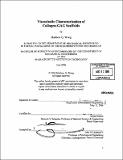Viscoelastic characterization of collagen-GAG scaffolds
Author(s)
Wong, Matthew Q
DownloadFull printable version (2.860Mb)
Other Contributors
Massachusetts Institute of Technology. Dept. of Mechanical Engineering.
Advisor
Lorna Gibson.
Terms of use
Metadata
Show full item recordAbstract
An experimental study was performed to determine whether or not collagen-GAG scaffolds exhibit linear viscoelastic behavior. Tension tests were performed on dry and hydrated engineered collagen-GAG scaffolds in order to develop a stress-strain curve. Strains that fell in the linear elastic region of these curves were selected and then used in stress relaxation tests that were also performed on dry and hydrated specimens. The relaxation modulus was calculated from the resulting stress relaxation curves at different strain levels and compared to each other to determine viscoelastic linearity. In addition to the determination of viscoelastic linearity, a water bath was designed in the hopes of performing stress relaxation tests in hydrated environment with the temperature maintained at 37°C, the temperature of the human body. These tests will aid in the future studies of how cells contract and apply force to the scaffolds since no previous studies have looked at the time dependent mechanical properties of these scaffolds. Moreover, the data can be used in the future to determine whether the viscoelastic response contributes to cellular processes such as migration speeds, attachment, and contraction.
Description
Thesis (S.B.)--Massachusetts Institute of Technology, Dept. of Mechanical Engineering, 2006. Includes bibliographical references (p. 43-45).
Date issued
2006Department
Massachusetts Institute of Technology. Department of Mechanical EngineeringPublisher
Massachusetts Institute of Technology
Keywords
Mechanical Engineering.